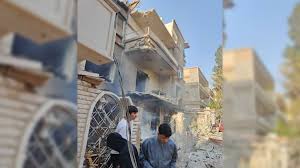The Syrian regime’s National Security Office recently issued a directive limiting the activities of Palestinian factions in Damascus. According to the local website Sawt al-Asema, this circular—distributed to the political, military, and social offices of Palestinian groups—restricts gatherings and meetings and confines the factions’ activities to their designated offices and headquarters.
Citing exclusive sources, the website reports that the directive, received by Palestinian authorities in early November, includes instructions to reduce operating hours for civil and social programs run by these factions, such as sewing associations, educational projects, small businesses, and charitable groups. The circular also calls for a gradual reduction in these activities, purportedly due to Israeli threats to target Palestinian organizations within Syria.
Furthermore, the directive bans overnight stays in political offices and mandates closures by 2 p.m. daily. It also prohibits gatherings outside faction offices in public or private areas and bans the carrying of any weapons, including personal arms, in vehicles.
Request for UNRWA Employee Data
According to sources from Sawt al-Asema, the Syrian State Security Department has recently reached out to senior Palestinian faction leaders and long-standing political figures in Syria, assuring them that these measures are intended for their protection. Additionally, the National Security Office has requested that the United Nations Relief and Works Agency for Palestine Refugees (UNRWA) implement stricter screening for new hires and periodically submit detailed data on both new and existing employees to the State Security Department, regardless of whether they are Syrian or Palestinian.
Ban on Palestinian Faction Demonstrations
Sources within Palestinian factions in Damascus informed Syria TV that the regime has recently prohibited public demonstrations by Palestinian groups, including those in support of the “axis of resistance,” since the outbreak of the Gaza conflict. Palestinian factions, as well as Syrian political groups, now require permission from security agencies to organize marches supporting Palestine and Lebanon. However, these requests are often denied, delayed, or limited to controlled environments such as camps, small solidarity gatherings, or seminars within closed venues like cultural centers, trade unions, or offices affiliated with Syrian and Palestinian parties.
Palestinian sources note that the regime justifies this ban by citing concerns over destabilizing Syria and creating potential targets for Israeli strikes. Syria has thus far maintained an official silence on events in Gaza and Lebanon, raising doubts and unease among Syrians and Palestinians about potential shifts in Syrian policy.
Concerns About Policy Shifts and Future Restrictions
There is rising concern among Palestinian factions in Damascus that the Syrian regime may impose further restrictions or even close faction offices entirely, as part of an apparent shift in its stance towards the “resistance axis.” Some factions have preemptively curtailed their activities for security reasons after targeted attacks on Palestinian leaders and fighters in Syria and Lebanon following security breaches.
Notably, the offices of Palestinian factions in Syria were previously closed for over a year in 2002, following threats from then Israeli Prime Minister Ariel Sharon, who accused Syria of harbouring “terrorist factions” amid intense U.S. pressure. These offices reopened in 2007 after Sharon fell into a coma in 2006.
Wider Restrictions on Palestinian Presence in Syria
In the broader context, rumors circulate within the Palestinian community about potential measures that could limit their status in Syria. Concerns include possible cuts to UNRWA services, changes to smart card allocations, and restrictions that might treat Palestinians as foreigners, potentially pressuring them to settle permanently by obtaining Syrian identity cards in place of their current temporary refugee documents.
UNRWA support in Syria—already stretched thin compared to Lebanon and Jordan—declined significantly even before the Gaza conflict. This decline, coupled with recent Syrian government policies preventing Palestinians from owning property, has fueled further anxiety within the Palestinian community about their long-term security and rights in Syria.
This article was edited by The Syrian Observer. The Syrian Observer has not verified the content of this story. Responsibility for the information and views set out in this article lies entirely with the author.


